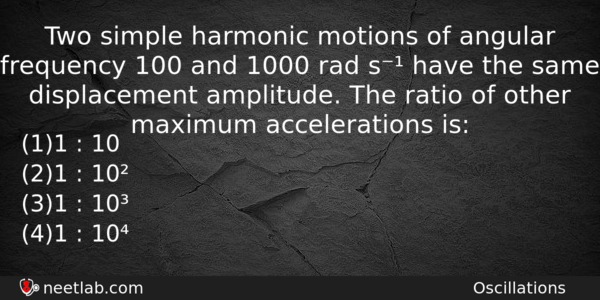| ⇦ | 
| ⇨ |
Two simple harmonic motions of angular frequency 100 and 1000 rad s⁻¹ have the same displacement amplitude. The ratio of other maximum accelerations is:
Options
(a) 1 : 10
(b) 1 : 10²
(c) 1 : 10³
(d) 1 : 10⁴
Correct Answer:
1 : 10²
Explanation:
Maximum acceleration of a particle in the simple harmonic motion is directly proportional to the square of angular frequency i.e., a(max)= – w ² A
As A remains same, we can say
a₁ / a₂ = w₁² / w₂² = (100)² / (1000)² = 1 / 100
⇒ a₁ : a₂ = 1 : 10²
Related Questions: - If alternating source of primary coil on transformer is replaced by a Laclanche cell
- A Si and a Ge diode has identical physical dimensions. The bandgap in Si is larger
- The difference in the lengths of a mean solar day and a sidereal day is about
- A proton is moving in a uniform magnetic field B in a circular path of radius a
- CO₂ laser uses
Topics: Oscillations
(58)
Subject: Physics
(2479)
Important MCQs Based on Medical Entrance Examinations To Improve Your NEET Score
- If alternating source of primary coil on transformer is replaced by a Laclanche cell
- A Si and a Ge diode has identical physical dimensions. The bandgap in Si is larger
- The difference in the lengths of a mean solar day and a sidereal day is about
- A proton is moving in a uniform magnetic field B in a circular path of radius a
- CO₂ laser uses
Topics: Oscillations (58)
Subject: Physics (2479)
Important MCQs Based on Medical Entrance Examinations To Improve Your NEET Score
18000+ students are using NEETLab to improve their score. What about you?
Solve Previous Year MCQs, Mock Tests, Topicwise Practice Tests, Identify Weak Topics, Formula Flash cards and much more is available in NEETLab Android App to improve your NEET score.
Share this page with your friends

Leave a Reply